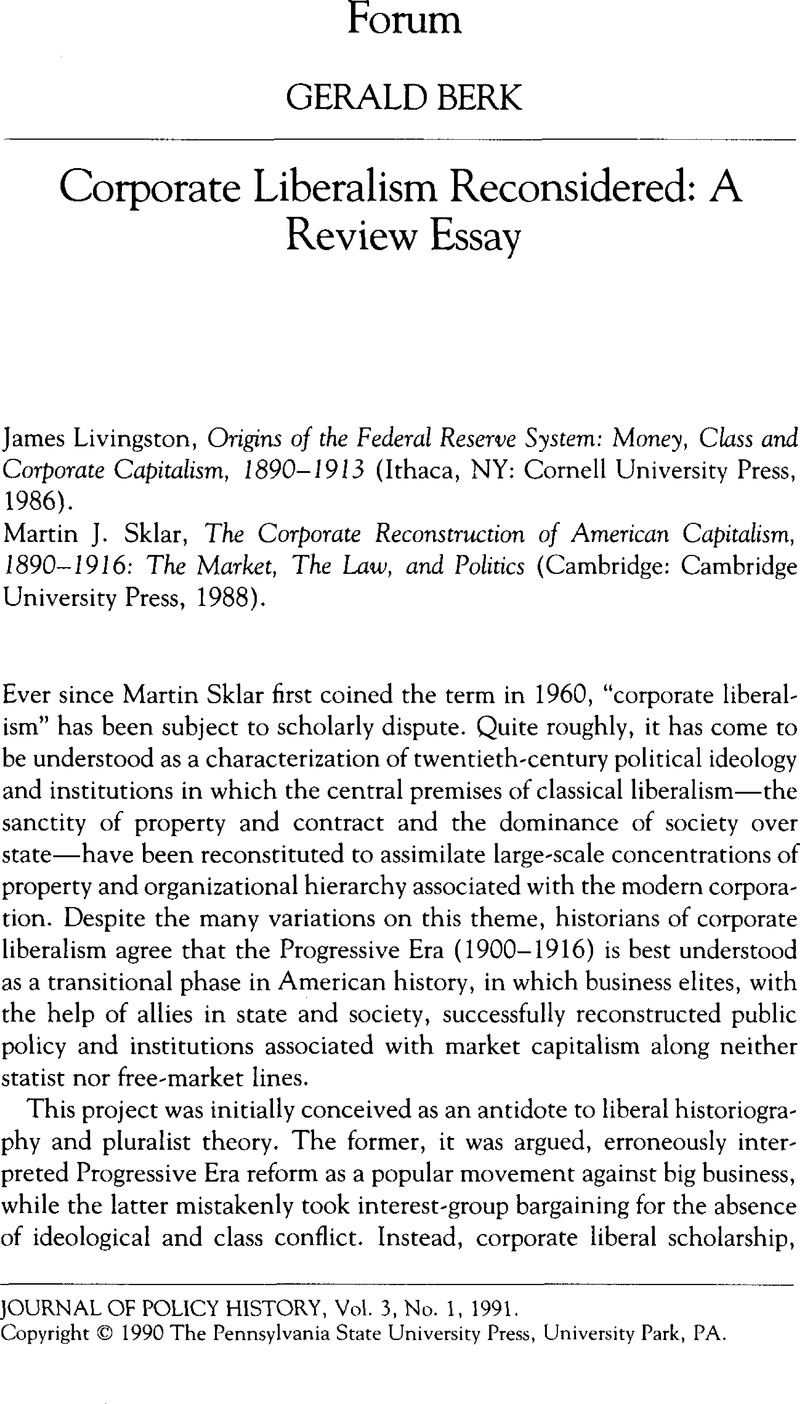Article contents
Corporate Liberalism Reconsidered: A Review Essay
Published online by Cambridge University Press: 14 October 2011
Abstract

- Type
- Forum
- Information
- Copyright
- Copyright © The Pennsylvania State University, University Park, PA. 1991
References
Notes
1. On the relationship between pluralist theory and industrialization, see Rogin, Michael, The Intellectuals and McCarthy: The Radical Specter (Cambridge, Mass., 1978), 9–58.Google Scholar On the first round of left corporate liberal scholarship, see Sklar, Martin J., “Woodrow Wilson and the Political Economy of Modern United States Liberalism,” Studies on the Left 1 (1960):17–47Google Scholar; Weinstein, James, The Corporate Ideal in the Liberal State: 1900–1918 (Boston, 1968)Google Scholar; and Parinni, Carl P., Heir to Empire: U.S. Economic Diplomacy, 1916–1923 (Pittsburgh, 1969).Google Scholar For a review of corporate liberal scholarship across the ideological spectrum, see Hawley, Ellis, “The Discovery of ‘Corporate Liberalism’”, Business History Review 52 (Autumn 1978):309–20.Google Scholar
2. Vogel, David, “Why Businessmen Mistrust Their State: The Political Consciousness of American Corporate Executives,” British Journal of Political Science 8 (January 1978):45–78CrossRefGoogle Scholar; Skocpol, Theda, “Political Response to Capitalist Crisis: Neo Marxist Theories of the State and the Case of the New Deal,” Politics and Society 10:2 (1980):155–205CrossRefGoogle Scholar; Critchlow, Donald, The Brookings Institution, 1916–1952: Expertise and the Public Interest in a Democratic Society (DeKalb, IL, 1985), 3–16Google Scholar; Skowronek, Stephen, Building a New American State: The Expansion of National Administrative Capacities, 1877–1920 (Cambridge, 1984).Google Scholar For a similar critique of corporate liberal scholarship in foreign policy, see Becker, William, The Dynamics of Business-Government Relations: Industry and Exports, 1893–1921 (Chicago, 1982).Google Scholar
3. See Chandler, Alfred D., Jr., The Visible Hand: The Managerial Revolution in American Business (Cambridge, MA, 1977)Google Scholar; McCraw, Thomas K., Prophets of Regulation: Charles Francis Adams, Louis D. Brandeis, James M. Landis, Alfred E. Kahn (Cambridge, MA, 1984)Google Scholar; Galambos, Louis, “The Organizational Synthesis in American History,” Business History Review 44 (1983):279–90.CrossRefGoogle Scholar
4. Sklar, Martin J., The Corporate Reconstruction of American Capitalism (Cambridge, 1988), 13.Google Scholar
5. Livingston, James, Origins of the Federal Reserve (Ithaca, NY, 1986), 34.Google Scholar
6. Sklar, Corporate Reconstruction, 87 (emphasis mine).
7. Livingston, Origins of the Federal Reserve, 93.
8. See Scranton, Philip, Proprietary Capitalism: The Textile Manufacture at Philadelphia (Cambridge, 1983)Google Scholar; Berk, Gerald, “Constituting Corporations and Markets: Railroads in Gilded Age Politics, Studies in American Political Development 4 (1990): 130–68CrossRefGoogle Scholar; idem, Corporations and Politics in American Development (Baltimore, forthcoming); Sabel, Charles and Zeitlin, Jonathan, “Historical Alternatives to Mass Production: Politics, Markets and Technology in Nineteenth-Century Industrialization,” Past and Present 108 (August 1985): 133–76CrossRefGoogle Scholar; Herrigal, Gary, “Industrial Order and the Politics of Industrial Change: Mechanical Engineering,” in Katzenstein, Peter, ed., Industry and Politics in West Germany: Toward a Third Republic (Ithaca, NY, 1989).Google Scholar
9. Goodwyn, Lawrence, Democratic Promise: The Populist Moment in America (New York, 1976).Google Scholar
10. Berk, Corporations and Politics.
11. Destler, Chester McArthur, “The Influence of Edward Kellogg upon American Radicalism, 1865–1896, ”in Destler, Chester McArthur, American Radicalism, 1865–1901 (Chicago, 1966).Google Scholar See also Hattam, Victoria, “Economic Visions and Political Strategies: American Labor and the State, 1865–1905,” Studies in American Political Development 4 (1990): 82–129CrossRefGoogle Scholar; Berk, Corporations and Politics; Palmer, Bruce, Man over Money: The Southern Populist Critique of American Capitalism (Chapel Hill, N.C., 1980).Google Scholar
12. On Brandeis's thought, see Strum, Philippa, Louis D. Brandeis: Justice for the People (Cambridge, MA, 1984), 132–58CrossRefGoogle Scholar; and Lief, Alfred, ed., The Social Economic Views of Mr. Justice Brandeis (New York, 1930).Google Scholar
13. On Brandeis's understanding of economies of scale and his role in regulating public utilities, see Strum, Louis D. Brandeis, 67–72; Brandeis, Louis D., Business—A Profession (Boston, 1925), 109, 313–19. For a criticism of Brandeis on this point, see McCraw, Prophets of Regulation, 80–142.Google Scholar
14. On electoral demobilization in the Progressive Era, see Burnham, Walter Dean, The Current Crisis in American Politics (Oxford, 1988), 121–65.Google Scholar
- 8
- Cited by




